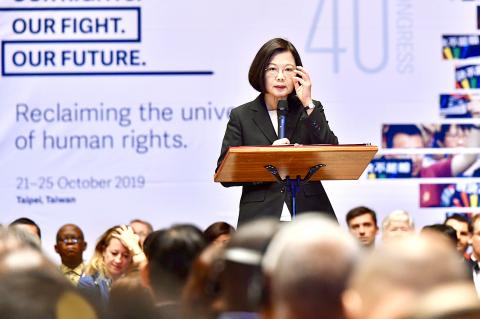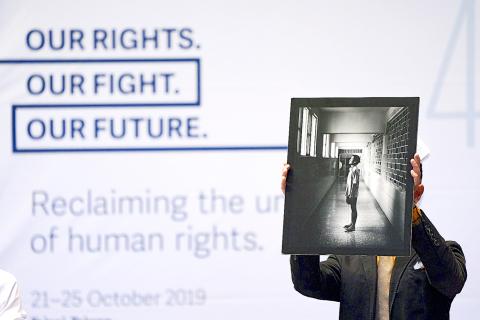The International Federation for Human Rights (FIDH) yesterday opened its 40th congress in Taipei, the first time the event has been held in Asia.
More than 400 rights advocates, government officials and experts from 184 non-governmental organizations (NGOs) in 112 countries are attending the five-day congress, said the Taiwan Association for Human Rights, which is cohosting the event.
Taiwan was chosen to host this year’s congress, which is held every three years, because it is a vibrant democracy, which “stands in stark counterpoint to many of its regional neighbors,” the federation said.

Photo: Tu Chien-jung, Taipei Times
In a speech at the opening ceremony, President Tsai Ing-wen (蔡英文) said the government is committed to improving human rights protection in a wide range of areas.
Her administration has introduced measures to eliminate workplace discrimination against women, promoted judicial reforms and pushed legislation to make Taiwan the first Asian nation to legalize same-sex marriage, she said.
“I have to tell you it was not an easy process to go through, but we finally made it,” she said.

Photo: CNA
The road to human rights is a long one, but together with NGOs, the government would continue to work toward building “a fairer and more just” Taiwan, she said.
The congress will hopefully provide an opportunity for Taiwan to learn from other nations’ experiences and share its own, Tsai added.
Under this year’s theme of “Our Right, Our Fight, Our Future — Reclaiming the Universality of Human Rights,” congress delegates hope to explore questions such as how to ensure equal rights for minorities and in cross-border situations, association president Clarence Chou (周宇修) said.
The sharing of experience between advocates and experts from different parts of the world is essential in the fight to improve human rights, he said.
The ceremony also featured an open plea from former death row inmate Hsu Tzu-chiang (徐自強) for Chiou Ho-shun (邱和順), who remains on death row, and whom Hsu said was wrongfully convicted of murder as he had been.
Hsu, who was convicted of the 1995 kidnap and murder of businessman Huang Chun-shu (黃春樹), was imprisoned for 16 years, spending most of the time on death row, before he was released in 2012.
It took another four years to clear his name, as it was not until October 2016 that the Supreme Court ruled that he was not guilty, rejecting prosecutors’ appeals.
Hsu’s was one of the nation’s highest-profile human rights cases at the time.
Chiou was sentenced to death for the 1987 kidnap and slaying of nine-year-old Lu Cheng (陸正).
The Supreme Court in July 2011 reaffirmed his death sentence.
His case is controversial because of the lack of forensic evidence, and allegations that his confession was obtained under torture.
“I do not have big dreams. I only hope that there will not be another Hsu Tzu-chiang,” Hsu said, expressing the hope that the federation would help Chiou as it helped him.
The congress features a two-day forum, which began yesterday, followed by internal meetings on the organization’s governance and a board election, the federation said.
Additional reporting by staff writer

AIR SUPPORT: The Ministry of National Defense thanked the US for the delivery, adding that it was an indicator of the White House’s commitment to the Taiwan Relations Act Deputy Minister of National Defense Po Horng-huei (柏鴻輝) and Representative to the US Alexander Yui on Friday attended a delivery ceremony for the first of Taiwan’s long-awaited 66 F-16C/D Block 70 jets at a Lockheed Martin Corp factory in Greenville, South Carolina. “We are so proud to be the global home of the F-16 and to support Taiwan’s air defense capabilities,” US Representative William Timmons wrote on X, alongside a photograph of Taiwanese and US officials at the event. The F-16C/D Block 70 jets Taiwan ordered have the same capabilities as aircraft that had been upgraded to F-16Vs. The batch of Lockheed Martin

US President Donald Trump yesterday announced sweeping "reciprocal tariffs" on US trading partners, including a 32 percent tax on goods from Taiwan that is set to take effect on Wednesday. At a Rose Garden event, Trump declared a 10 percent baseline tax on imports from all countries, with the White House saying it would take effect on Saturday. Countries with larger trade surpluses with the US would face higher duties beginning on Wednesday, including Taiwan (32 percent), China (34 percent), Japan (24 percent), South Korea (25 percent), Vietnam (46 percent) and Thailand (36 percent). Canada and Mexico, the two largest US trading

GRIDLOCK: The National Fire Agency’s Special Search and Rescue team is on standby to travel to the countries to help out with the rescue effort A powerful earthquake rocked Myanmar and neighboring Thailand yesterday, killing at least three people in Bangkok and burying dozens when a high-rise building under construction collapsed. Footage shared on social media from Myanmar’s second-largest city showed widespread destruction, raising fears that many were trapped under the rubble or killed. The magnitude 7.7 earthquake, with an epicenter near Mandalay in Myanmar, struck at midday and was followed by a strong magnitude 6.4 aftershock. The extent of death, injury and destruction — especially in Myanmar, which is embroiled in a civil war and where information is tightly controlled at the best of times —

China's military today said it began joint army, navy and rocket force exercises around Taiwan to "serve as a stern warning and powerful deterrent against Taiwanese independence," calling President William Lai (賴清德) a "parasite." The exercises come after Lai called Beijing a "foreign hostile force" last month. More than 10 Chinese military ships approached close to Taiwan's 24 nautical mile (44.4km) contiguous zone this morning and Taiwan sent its own warships to respond, two senior Taiwanese officials said. Taiwan has not yet detected any live fire by the Chinese military so far, one of the officials said. The drills took place after US Secretary